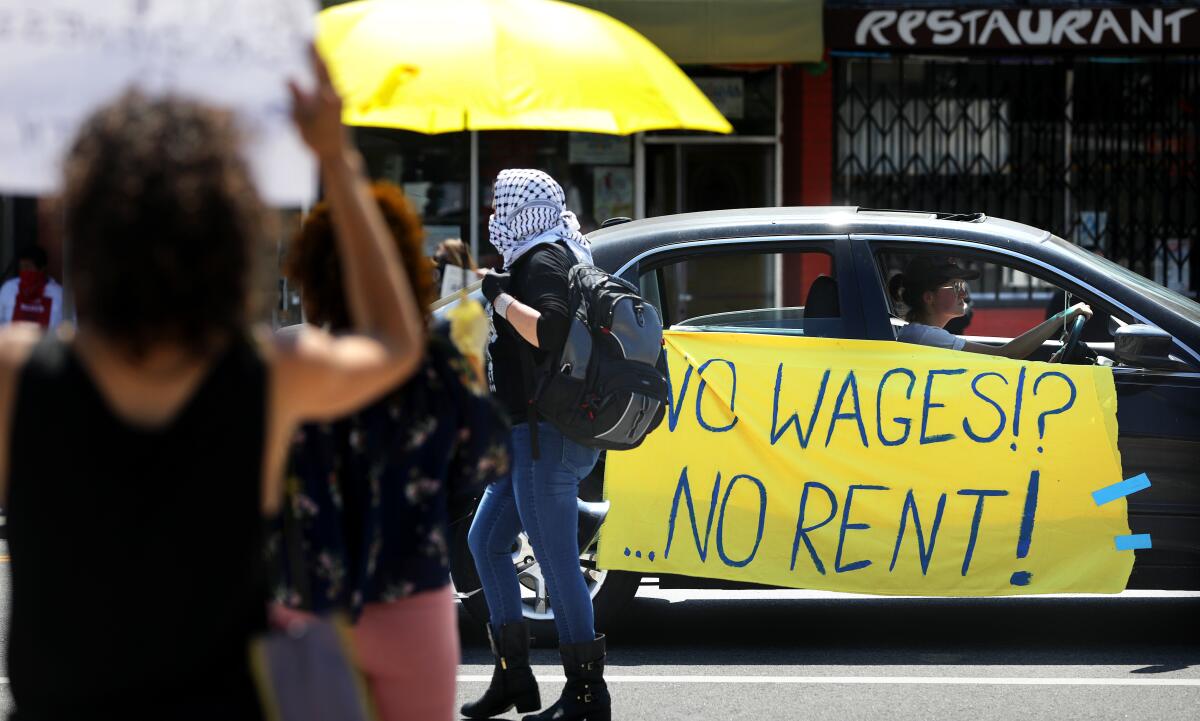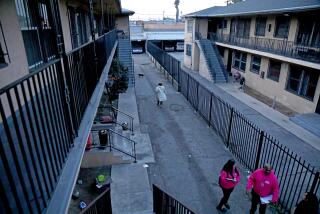Editorial: It’s not just renters. Landlords need help, too

A growing number of states and cities have enacted eviction moratoriums to protect tenants from losing their homes if they can’t pay the rent during the coronavirus emergency.
This is just common sense. Governments have ordered businesses to close and people to shelter in place to avoid spreading COVID-19; it would be cruel and counterproductive if people who’ve lost their jobs and their incomes also lose their homes.
But this temporary reprieve is not easy to grant or without pitfalls.
Most moratoriums simply halt evictions for non-payment. Tenants will eventually have to come up with the rent payments they missed. If they can’t pay off their rent debt, they’ll still face eviction and hardship. Tenant groups are pushing governors in California, New York, Washington and other states to go further and use their emergency powers to fully cancel rent obligations until communities reopen. And others are calling on tenants to withhold payments in a coordinated rent strike on May 1 to force the issue.
What about the landlords? Eviction moratoriums force property owners to go without rent payments for two to six months, or possibly even longer if the social-distancing-driven shutdowns drag on. How are landlords supposed to pay their property taxes or utility bills? How can they pay the employees who manage the day-to-day operations of properties?
Renters need help, but so do landlords. We want landlords to stay in business. They provide an essential service: a roof over one’s head.
It should be clear to lawmakers that the next federal relief package has to help landlords stay afloat too.
Most landlords are small-business owners who rely on rent payments for their income or retirement. Nearly three-quarters of apartment properties in the U.S. are owned by individuals, not corporations or investor groups, and most apartment buildings have only a handful of units. In California, about half of rentals are in properties with five units or less. If two tenants in a small complex can’t pay the rent, that’s a serious financial hit.
Without rent coming in, these landlords risk foreclosure if their lenders don’t give them the option to delay mortgage payments. Some landlords are entitled to that relief; under the Coronavirus Aid, Relief, and Economic Security Act that Congress passed last month, rental properties with federally backed loans can get their mortgage payments delayed if they do not evict tenants who can’t pay the rent during the coronavirus emergency. But only about half of landlords have government-backed mortgages; the rest have to individually negotiate an agreement with their lenders.
And that’s just the mortgage payment. Landlords still need to pay property taxes, insurance and maintenance, even if the rent checks stop coming.
There’s a real concern that the financial toll caused by lost rental income could prompt landlords to sell their properties in droves. That could also hasten the shift from mom-and-pop landlords to investment firms that own and manage huge numbers of rental properties. Advocates say that shift, which accelerated after the last recession, has already resulted in the loss of older, more affordable apartments as investors buy up properties to remodel and raise the rents.
And while the immediate concern is the fate of small landlords, policymakers should also worry that tenants’ inability to pay will eventually hit corporate owners of rental properties and large investors, too. Public employee pension funds have invested heavily in real estate and mortgage securities. If the value of the funds drop and the return on those investments declines, taxpayers have to make up the difference.
Again, the need to provide some kind of help to landlords is clear. The tougher question is, who will end up paying the cost?
One idea is to use federal tax dollars to provide rent vouchers to people whose incomes have dried up in the pandemic. That would help renters and landlords alike, albeit at the taxpayers’ expense. But policymakers would need to avoid the moral hazard of shielding giant corporate property owners and Wall Street investors from risks they chose to take, while also not duplicating the other forms of aid Congress has provided to help laid-off workers and small-business employees.
The complexities shouldn’t deter Congress from tackling the issue; the stakes are just too high. The COVID-19 pandemic is a stark reminder that communities have a shared interest in keeping people housed and keeping landlords in business. Eviction moratoriums were an important first step, but Congress and the Trump administration should be prepared to spend more time and money to ensure this temporary public health emergency doesn’t fuel another housing crisis.
More to Read
A cure for the common opinion
Get thought-provoking perspectives with our weekly newsletter.
You may occasionally receive promotional content from the Los Angeles Times.










